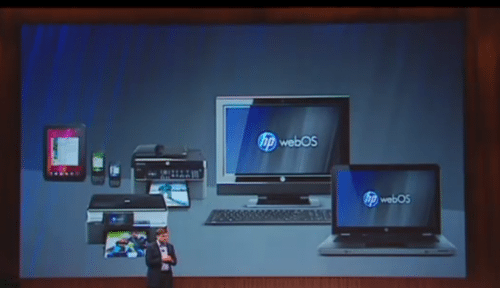
HP decided to end its ‘Think Beyond’ event with a surprise: webOS is coming to other connected devices, including printers, PCs and some form factors you haven’t seen before. HP hasn’t provided any additional details and it plans to do so only in the coming months. Do we think it means that HP plans to release PCs running webOS (similar to Google’s ChromeOS)? While it sounds very exciting, this is not likely to happen. Why?
On one hand, as a consumer, we see devices that blur the lines between the computer and the phone, like Apple iPad and Motorola Atrix. On the other hand, in the corporate world those segments are separated from each other. For example, it took over 3 years to convince Microsoft to enable Windows to run on devices that use ARM architecture (usually referred to as the smart-book). Intel gave up convincing Microsoft and Google to enable their mobile OS (Windows mobile and Android) to run on Intel Atom CPU, and decided to use the MeeGo OS instead. Therefore, while it will be exciting to see a webOS laptop it is not likely to happen, at least not for now. That leaves us with the question: what is HP planning to do with the webOS for computers and printers?
The traditional corporate way of thinking is to find ways to leverage the company assets. When we look on the webOS, it is another mobile OS, and not the dominant one. In other words, it is not an attractive platform for developers. On the other hand, HP is a dominant player in the computer and printer market. By enabling webOS application to run on HP computers and printers, HP can make the webOS a dominant platform and very attractive for developers. This can be an extension to HP’s OXP (Open Extensibility Platform) for running apps on HP printers. Apple is doing similar thing with the Mac App store and HP can use this idea too. While we will have to wait and see what HP is planning for us, it would be interested to hear what you think on it.



Gadgeteer Comment Policy - Please read before commenting
HP invested money and tested the waters with WebOS. Microsoft promptly fired a shot over its bow with Nokia. The message was clear, move ahead with WebOS in the PC market and we’ll bury your mobile efforts. Nokia has mobile device hardware manufacturing and design down to an art. While HP is a behemoth, it got that way not by going it alone but by supporting dominant operating systems.
With Android and Apple on one side and Microsoft/Nokia on the other not to mention RIM, WebOS came too little to late. Two years ago it would have had a chance, now it just jumped into the pen with a bunch of hungry lions.
That leaves WebOS as a second tier operating system that HP can use to support the big OS players. So long as HP goes the interoperability route which is the foundation for most of it’s services and products, WebOS gives HP something Dell and other competitors don’t have. If HP tries to buck the system now, it risks losing any value in it’s investment in Palm.
Platform for developers? What? If devices are able to access web, why platform should be interesting for “developers”? Isn’t platform in this case HTML5? Any device can use those apps. And it’s just great. It’s so annoying that some apps are restricted to some exact platform.